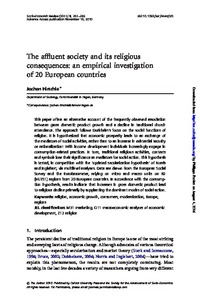The affluent society and its religious consequences: an empirical investigation of 20 European countries

2011
9
2
April
261-285
consumption ; economic growth ; religion ; statistics
Economic development
English
Bibliogr.
"This paper offers an alternative account of the frequently observed association between gross domestic product growth and a decline in traditional church attendance. The approach follows Durkheim's focus on the social functions of religion. It is hypothesized that economic prosperity leads to an exchange of the mediators of social activities, rather than to an increase in existential security or rationalization: With income development individuals increasingly engage in consumption-related practices. In turn, traditional religious activities, contexts and symbols lose their significance as mediators for social action. This hypothesis is tested, in competition with the ‘updated secularization hypothesis' of Norris and Inglehart, via multilevel analyses. Data are drawn from the European Social Survey and the Eurobarometer, relying on micro and macro units on 82 (NUTS1) regions from 20 European countries. In accordance with the consumption hypothesis, results indicate that increases in gross domestic product lead to religious decline primarily by supplanting the dominant modes of social action. "
Digital
The ETUI is co-funded by the European Union. Views and opinions expressed are however those of the author(s) only and do not necessarily reflect those of the European Union or the ETUI.